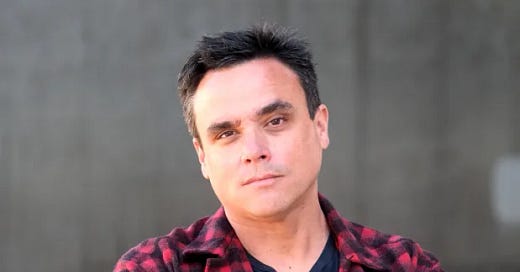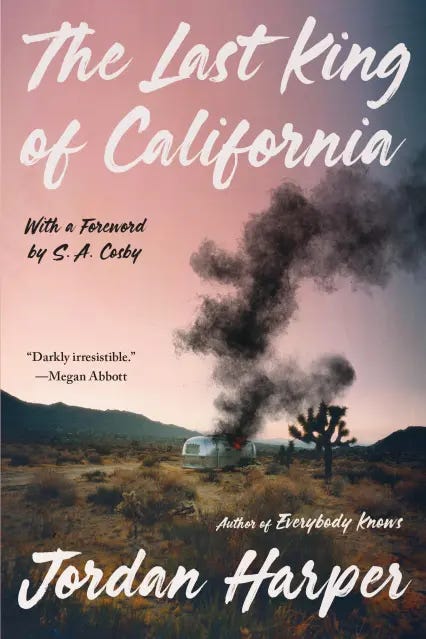#27: Five for Them, One for Me, with Jordan Harper
Jordan's latest, THE LAST KING OF CALIFORNIA, is out now.
Fans of James Ellroy know that the author used to open his appearances with a mile-a-minute monologue where he proclaims “I’m the author of (his current number of books), masterpieces all; they precede all my future masterpieces.”
I mention this for two reasons:
Jordan Harper’s published three novels, and they’re all masterpieces. This isn’t hyperbole, either; talk to enough crime writers and you’ll find the consensus that Jordan’s one of the five or six best authors working in the genre today—and genre be damned—is probably one of the best writers period. He won the Edgar for Best First Novel in 2018 for SHE RIDES SHOTGUN, and his 2023 novel, EVERYBODY KNOWS, was acclaimed by The New York Times, NPR, the L.A. Times, and basically anyone who read it.
Jordan’s the natural heir to Ellroy’s crown as the definite chronicler of Los Angeles’ seamier sides—except where Ellroy has spent his career dismantling the historical fantasy of southern California from the 1930s through the 1960s, Jordan’s firmly entrenched in the here-and-now, dissecting its gloss and glimmer with surgical precision.
Jordan’s latest, THE LAST KING OF CALIFORNIA, was originally published only in Europe in 2022, but has now been published in the United States. The American edition includes an insightful foreword from another noir master, S.A. Cosby.
Jordan’s a writer operating at the absolute top of his game, and he only continues to get better. I think LAST KING is his best work—a brutally and blistering study of family, the outlaw myth, and the struggle to escape our pasts.
Jordan’s also the latest Five for Them, One for Me.
Let’s go.
FIVE FOR THEM
1. What’s the origin point for THE LAST KING OF CALIFORNIA?
The book actually started as a whole other story, one that finally came together in the short story “My Savage Year.” While wrestling with how to tell the story of a high school teacher who commits a murder, I created the character of Luke Crosswhite, the son of a criminal family who doesn’t feel like he fits in with his dark world. He was supposed to counterpoint the teacher, who appears to be normal and good but in fact is the epitome of evil. But it didn’t work, and I ended tearing it all up. But I liked Luke and his basic situation, so I aged him up a few years and put him in the world that I had created for She Rides Shotgun, and this novel was born.
2. You’ve described California as “America with its back up against the wall.” Can you talk about that, and how it reflects in your work?
Well, that’s a line that I’ve plagiarized from my next book, so I’ll sit on most of that answer so you can hear it from the character’s mouth. But it comes from an idea that writing about California isn’t different than writing about America in general - that this is America concentrated, America at its highpoint and lowpoint. It’s the world capital of noir because noir is about the rot at the heart of the American dream (even international noir must deal with America, even if only subconsciously). This is it; this is the place where the scores will be settled.
3. Chapter 13 of THE LAST KING OF CALIFORNIA has a beautifully evocative description of Luke, the book’s main protagonist, going to a concert—but it’s more than that, because it’s also an awakening for his character. What’s the importance of music in your own life and how does it influence you?
I am an ex-music critic, and in general a fan of music as the art form that can most easily push itself into a person’s affective experience of the world. While we take in the most information from sight, it’s often sound that can reach into our emotional register the easiest, and sometimes the deepest. Working in prose of course cuts you off from this, so I like to try and capture the way music can change a person’s affect in general.
Also, for anyone curious, the band Luke stumbles into seeing is SUNN0))), and it’s a pretty accurate description of what it’s like to see one of their shows from close-up.
4. THE LAST KING OF CALIFORNIA has connective tissue that ties it to your other novels, SHE RIDES SHOTGUN and EVERYBODY KNOWS, though each book can be read discrete of the others. Did you always plan on that, or was it something that simply happened in the writing?
I’ve always loved books that have shared universes, from Stephen King to James Ellroy, so from the very start I’ve always intended for all my work to take place in a single shared world. There are things that connect between SHE RIDES SHOTGUN and my short story collection LOVE ANE OTHER WOUNDS, and my uncollected short story “Christmas Morning Coming Down” is also connected by my returning character Scubby.
5. In a recent interview, you called THE LAST KING OF CALIFORNIA more “literary” than your “pulpy” debut, SHE RIDES SHOTGUN, or the L.A. noir/Ellroy-esque EVERYBODY KNOWS. What does that mean to you? How does this book sit in the framework of your own work?
“More literary” means a couple of things—the language is slower and less punchy, with less a reliance on percussive Anglo-Saxon root words than my normal work. It’s also slower, more content to pass a chapter without moving forward a plot, and with a less easily communicated central story—it’s not a book that people tell me “Oh I can see this as a movie,” which I tend to hear a lot about my work. It’s also the book of mine that probably least earns its place on the Mystery shelf, as opposed to the general literature shelf.
I think everything above is value-neutral, by the way. This is just what this book is - each of my books so far is an outlier in one respect or another (as much as one can have outliers in a sample size of three). The only one that really matters is the one about shelf space—because I have no interest in “transcending the genre,” but I am interested in audiences that maybe don’t walk through the mystery shelves.
ONE FOR ME
EVERYBODY KNOWS could be the basis for a food tour of L.A., while LAST KING is rife of descriptions of prison chow and gas station fried chicken. What’s your dining guilty pleasure?
I’m cautious of the phrase “guilty pleasure” in general—I try very hard to just like what I like and not let outside judgement effect that one way or another. Also, as you can tell by the kind of food I tend to write about, I have a pretty strong preference for street food over fine dining, so I don’t have a lot of shame about what I eat.
However, if you could see how much Pizza Hut pizza I eat, I would in fact feel pretty guilty about it.
HAPPY HANUKKAH (AND ALSO, SOME SHAMELESS SHILLING)
Hanukkah begins tomorrow night (December 25), and that’s as good a reason as any to mention this excellent interview with EIGHT VERY BAD NIGHTS editor Tod Goldberg, by the always-great James Queally.
I’ve talked (and talked) about EIGHT VERY BAD NIGHTS a lot, and I’ll talk more about in a year-end wrap-up post, but I can’t say enough how great each story in this collection is. Everyone here brought their A-game, and it’s a fantastic read for the holidays—if you like your holidays dark as fuck.
That’s all we’ve got for now. Thanks for coming. See you next time, and hey, let’s be careful out there.







It's always a treat to hear Jordan Harper riff on noir... Thank you for wrangling him in for an interview!